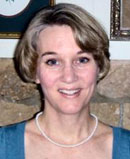 |
|||
| College of Education Home | News & Events | Make a Gift | UW Alumni | |||
|
May 2009 | Return to issue home
Jenny Quynn Brings World View to Her Research
Jenny Quynn, a fourth-year doctoral student in Educational Psychology has taught math in several geographical locations, including Botswana and Baltimore. Her research has caused her to question the process of learning. As she relates, “My work in classrooms left me with a lot of questions regarding what it means to learn and how we know when it happens—questions that I didn’t have the time to answer while teaching over 100 middle school students daily.” Quynn’s current research focuses on formative assessment and, in particular, the feedback practices of math and science teachers. “I work to uncover the qualities of feedback that lead the most unsuspecting student to understand concepts in mathematics and science,” she states. “Many students have not experienced success in either subject and arrive in classrooms underprepared to continue. My work seeks to untangle the qualities of a teacher’s feedback practice that has the potential to change all of that.” Her research is one part of a larger investigation into the entire classroom assessment cycle and includes an international team of researchers led by her adviser, Dr. Min Li. “It is fascinating and by far the most exciting part of my job to work with people from other parts of the world,” Quynn says. “By taking very different roads we have arrived at the University of Washington with similar questions and here we share our perspectives to contribute to the process of contextualizing learning and feedback. When we talk about feedback we take into account teachers’ goals and beliefs about what it means to learn science and mathematics. The U.S. stretches the definition out to include what others might see as luxury learning or learning beyond what it takes to do well on exams.” Without her team, Quynn feels that findings would be myopic and skewed and looks forward to maintaining international relationships over her lifetime. National Science Foundation (NSF) East Asia and Pacific Summer Institutes (EAPSI) funding allowed Quynn to spend the summer of 2008 in Singapore, conducting research in secondary classrooms on the feedback practices of mathematics and science teachers there. “I targeted Singapore because of recent attention from international measures such as TIMSS,” she explains. “I spent my time mainly in two government secondary schools, one centrally located and the other in the eastern part of the island. In all, 11 teachers chose to participate in the project that involved digitally capturing a series of lessons, collecting examples of student work and written feedback and interviewing teachers to better understand their goals and the pedagogical reasons behind decisions made.” When she wasn’t observing lessons, Quynn spent time in school canteens, meeting with teachers over a cup of hot tea and a dish of spicy noodles, becoming a student of what it means to live and teach in Singapore. “My experiences in Singapore did nothing to dissuade me from believing that there are wonderful teachers everywhere, open to sharing their classroom experiences, willing to compare notes and interested in bettering their teaching practices,” Quynn says. “I was amazed at the number of teachers and administrators who asked me to provide them with written feedback about my experience in their schools.” Singapore reminded Quynn of Botswana, also under the Cambridge system of learning and assessment and a place where teachers spend many hours of the day marking the written work of their students, providing their students an indication of whether or not they are on the right track. Quynn’s research continues at the University of Washington where she works to develop a method for analyzing teacher feedback in the classroom environment informed by data collected in Singapore and Seattle. She also includes international data from a survey that she and colleague Shinping Tsai designed to understand the relationship between goals and feedback practices of teachers internationally. This has grown to be more than just a survey for Singapore and Seattle teachers now that Eunlim Chi, a visiting scholar, has facilitated the survey in her own country, Korea. “My hope is that our findings will lead to developing reliable and valid indicators that will allow teachers to self assess their own practice, reflect and make changes according to their goals,” Quynn states. “The work holds potential only because the goals of classroom teachers are at its core and this makes the process a valid and meaningful way to conduct teacher evaluation.”
May 2009 | Return to issue home | |||
|
|||
